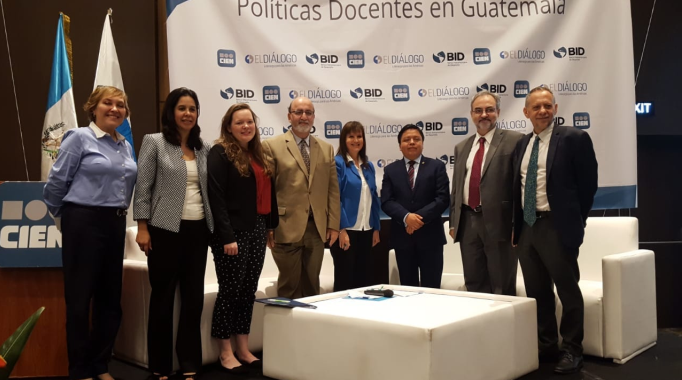Protecting Latin America’s Poor During Economic Crises
History tells us that economic crises cause large increases in poverty. The most recent economic crisis will cause Latin America’s GDP to contract around 2 percent in 2009.
This post is also available in: Español
On June 26, the Inter-American Dialogue, in partnership with CIEN (Centro de Investigaciones Económicas Nacionales) and the Inter-American Development Bank (IDB), hosted an event in Guatemala City on “Teacher Policies in Guatemala: 2018 Update.” The purpose of the event was to analyze the current state of teacher policies in Guatemala, and policy developments from the past three years. During the event, researchers from CIEN presented an update to the 2015 Guatemala teacher policy report card, published as part of the first phase of the Inter-American Dialogue’s project on teacher policy in Latin America.
The event opened with welcoming remarks from Jorge Lavarreda, President of CIEN, who offered a brief summary of the project and described the primary areas of investigation in the teacher policy report card. Lavarreda was followed by Ariel Fiszbein, Director of the Education Program at the Inter-American Dialogue, who offered a regional perspective on the state of teacher policies and what progress has been achieved since the first teacher policy report cards were published in 2015. Fiszbein emphasized the growing public recognition of the importance of teacher quality as an essential input for improving education outcomes. “Recognizing the problem is the first step. Now we need to understand exactly where the challenges are,” said Fiszbein.
Fiszbein’s comments were followed by a presentation from Veronica Spross de Rivera and Maria Isabel Bonilla, Associate Researchers at CIEN. Spross de Rivera began by affirming that the purpose of this project is to promote informed debate and a shared consensus among stakeholders on what must be done to improve education quality in Guatemala. Discussing current education indicators, Spross de Rivera highlighted the fact that there are still large gaps in student achievement on reading and math assessments, and less than 10% of secondary graduates achieve satisfactory scores on the math evaluation.
https://twitter.com/CIENgt/status/1011622206621831169
The majority of the presentation focused on the recommendations presented in the 2015 teacher policy report card, and what progress has been made toward achieving each one. For example, one recommendation of the 2015 report card was the need to strengthen the selection criteria for teachers, yet teacher entrance exams show concerning gaps: applicants respond correctly to less than half of the questions on evaluations of their knowledge of math, languages and pedagogy. An area where there has been progress is in supporting new and in-service teachers to strengthen their practice. The newly created National System for Educational Accompaniment (SENAE) aims to support teachers and administrators to improve their pedagogical and managerial practices.
Continuing the presentation, Maria Isabel Bonilla noted that other recommendations in the report—such as the need to establish teacher incentives for good performance that include student learning data, establishing a career ladder for teachers that aligns with existing policies and attracts the best candidates and developing a career ladder for school leaders—have not been addressed in the three years since the teacher policy report card was published. To conclude the presentation, Bonilla showed that, of the nine dimensions evaluated in 2015, there has only been partial progress in two areas, a clear indication of the continued need for open and serious debate on how to improve teacher policies in the country.
The event concluded with a panel discussion moderated by Maria del Carmen Aceña, former Minister of Education of Guatemala, former Executive Director of CIEN, and currently an associate researcher with the organization. Héctor Canto, Vice minister of Education, Ernesto Martínez, Principal Education Specialist with the IDB in Guatemala and Roberto Moreno, President of the Universidad del Valle de Guatemala and Coordinator of the Gran Campaña Nacional por la Educación, served as panelists. In his opening comments, Moreno suggested that in terms of teacher preparation, there has been some progress in recent years, notably the development of the SENAE, but in other areas such as recruitment, selection and training of quality candidates, there is still a need for clear and effective policies.
Martinez focused his comments on the need to understand fully the challenges and gaps to improving education. “Knowledge is the basis of change and if we don’t understand [these issues], the knowledge gap about how to develop the country will only continue to grow,” said Martinez. He also expressed his support for the document as a road map to improving current policies, adding that although there is now a general consensus about what needs to be done, there remain differing opinions on how to do it.
https://twitter.com/RadioPuntoGT/status/1011642702386122752
Viceminister Canto dedicated his comments to some of the challenges and priorities for the current administration in improving and strengthening teacher policies, including the need to accelerate the pace at which teacher training reforms are implemented, and the specific challenges that emerge when trying to recruit and assign teachers to work in rural and indigenous zones, where students and parents may struggle to communicate in Spanish. Canto indicated that increasing educational spending and long-term strategic planning—both priorities of the current administration—are crucial to improving teacher policies.
In all, while policy measures were instated in a couple of key issue areas, and public recognition of the importance of teacher policies increased, little progress has been made in most areas, which evidences the need for continued policy advocacy and research.
History tells us that economic crises cause large increases in poverty. The most recent economic crisis will cause Latin America’s GDP to contract around 2 percent in 2009.
The goal of education is to promote learning. Sitting in classrooms is a weak proxy for knowing how to read, do math, and apply science. Latin America needs to worry less about schooling and more about learning.
The mobilization of 70,000 students in the streets of Chile is more than just a protest for free higher education.
